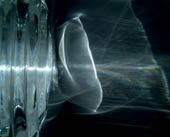
Purpose
To demonstrate the principle of refraction of light rays in water.
Additional information
Refraction is the process by which a wave bends when it enters a different medium owing to an alteration in the speed at which it travels. As light passes from one transparent medium into another, it changes speed and bends as a result of this. The extent of bending depends on the ‘refractive index’ of the medium as well as the angle between the light ray and the line perpendicular to the surface (known as the ‘normal’) separating the two mediums (or the ‘medium interface’.) Each medium has a different refractive index; the angle between the light ray and the normal as it enters a medium is called the ‘angle of refraction’, while the angle between the light ray and the normal as it leaves a medium is called the ‘angle of incidence’.
Sponsored Links
Required materials
- Glass tumbler
- Piece of colored paper
- Saucer
Estimated Experiment Time
Less than 5 minutes
Step-By-Step Procedure
- 1. Take a glass tumbler and fill it with water
- 2. Place a small piece of colored paper on a table before placing the glass tumbler containing water over it
- 3. Cover the glass with a saucer
- 4. Try to look at the colored paper placed under the tumbler
Note
The saucer must be wide enough to cover more area than just the mouth of the tumbler.
Observation
The colored paper vanishes, and is invisible irrespective of the angle from which it is looked at.
Result
This is due to the phenomenon of ‘refraction’ or the bending of light rays when they pass at an angle from one medium to another. Light rays falling on the paper get refracted and bend upward as they pass from water to air. The refracted rays are unable to emerge from the tumbler since its path is blocked by the opaque saucer. Thus the colored paper can't be seen from any angle and it appears to vanish.
Sponsored Links
Take a moment to visit our table of Periodic Elements page where you can get an in-depth view of all the elements,
complete with the industry first side-by-side element comparisons!